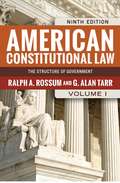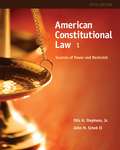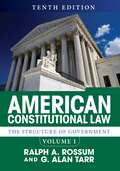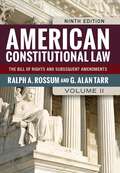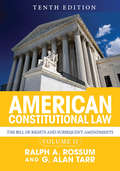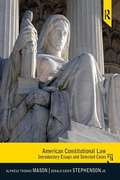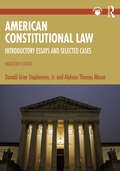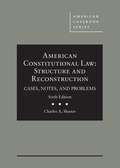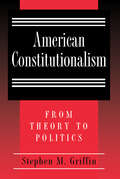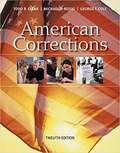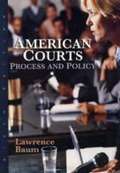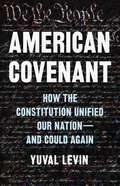- Table View
- List View
American Constitutional Law, Volume I
by Ralph A. Rossum G. Alan TarrThe study of the Constitution and constitutional law is of fundamental importance to understanding the principles, prospects, and problems of America. American Constitutional Law, Volume I provides a comprehensive account of the nation’s defining document, comparing how its provisions were originally understood by those who drafted and ratified it with contemporary constructions. The authors examine the constitutional thought of the founders, as well as interpretations of the Constitution by the Supreme Court, Congress, the President, lower federal courts, and state judiciaries to provide students with a sense of how the law has been interpreted over the years. Now fully updated, the ninth edition of this classic volume features several new cases including National Federation of Independent Business v. Sebelius, Arizona v. United States, and Caperton v. A. T. Massey Coal Company Visit westviewconlaw. com for instructor resources, including recently decided cases, material from prior editions, and a glossary.
American Constitutional Law, Volume I
by Ralph A. Rossum G. Alan TarrAmerican Constitutional Law provides a comprehensive account of the nation’s defining document. Based on the premise that the study of the Constitution and constitutional law is of fundamental importance to understanding the principles, prospects, and problems of America, this text puts current events in terms of what those who initially drafted and ratified the Constitution sought to accomplish. The authors examine the constitutional thought of the founders, as well as interpretations of the Constitution by the Supreme Court, Congress, the President, lower federal courts, and state judiciaries. Now fully updated, the eighth edition of this classic volume focuses on federal rights and powers and incorporates six new cases, including Boumediene v. Bush, Medellin v. Texas, Hein v. Freedom from Religion Foundation, and Plains Commerce Bank v. Long Family Land and Cattle Company. Also available in its eighth edition from authors Ralph A. Rossum and G. Alan Tarr: American Constitutional Law, Volume II: The Bill of Rights and Subsequent Amendments (Westview Press, ISBN 978-0-8133-4478-2).
American Constitutional Law, Volume I: Sources of Power and Restraint (5th Edition)
by John M. Scheb II Otis H. Stephens Jr.AMERICAN CONSTITUTIONAL LAW, Volumes I and II, combines cases, decisions, and authorial commentary to maximize your learning and understanding in this course. These comprehensive volumes cover the entire range of topics in constitutional law. Each of the chapters includes an extended essay providing the legal, historical, political, and cultural contexts for the set of edited decisions from the United States Supreme Court case that follows. In selecting, editing, and updating the materials, the authors emphasize recent trends in major areas of constitutional interpretation. At the same time, the authors include many landmark decisions, some of which retain importance as precedents while others illustrate the transient nature of constitutional interpretation. Because the book provides a good balance of decisions and authorial commentary, this text appeals to instructors of law as well as instructors of political science.
American Constitutional Law, Volume I: The Structure of Government
by Ralph A. Rossum G. Alan TarrA comprehensive core textbook and casebook that emphasizes precedent setting cases and alternative constitutional positions for courses in constitutional law and civil liberties.
American Constitutional Law, Volume I: The Structure of Government
by Ralph A. Rossum G. Alan TarrAmerican Constitutional Law, Volume I provides a comprehensive account of the nation's defining document, examining how its provisions were originally understood by those who drafted and ratified it, and how they have since been interpreted by the Supreme Court, Congress, the President, lower federal courts, and state judiciaries. Clear and accessible chapter introductions and a careful balance between classic and recent cases provide students with a sense of how the law has been understood and construed over the years.The Tenth Edition has been fully revised to include seven new cases, including key decisions National Labor Relations Board v. Noel Canning, Zivotofsky v. Kerry, Adoptive Couple v. Baby Girl, Horne v. Department of Agriculture and Comptroller of the Treasure of Maryland v. Wynne.A revamped and expanded companion website offers access to even more additional cases, an archive of primary documents, and links to online resources, making this text essential for any constitutional law course.
American Constitutional Law, Volume II
by Ralph A. Rossum G. Alan TarrEnhance your understanding of the nation ‚'s defining document with AMERICAN CONSTITUTIONAL LAW: THE BILL OF RIGHTS AND SUBSEQUENT AMENDMENTS, VOLUME II! With a focus on individuals ‚' rights and responsibilities, this political science text provides you with the information you need to understand the principles, prospects, and problems of America. Chapter and case introductions frame the development of the law and help you understand both the material and its context. Precedent-setting cases in areas such as privacy, criminal procedure, and abortion rights are included in the text and you can use the companion website to read additional cases of historical significance and current cases as they are decided.
American Constitutional Law, Volume II
by Ralph A. Rossum G. Alan TarrThe study of the Constitution and constitutional law is of fundamental importance to understanding the principles, prospects, and problems of America. American Constitutional Law, Volume II, provides a comprehensive account of the nation's defining document, comparing how its provisions were originally understood by those who drafted and ratified it with contemporary constructions. The authors examine the constitutional thought of the founders, as well as interpretations of the Constitution by the Supreme Court, Congress, the President, lower federal courts, and state judiciaries to provide students with a sense of how the law has been interpreted over the years. Now fully updated, the ninth edition of this classic volume features eleven new cases including Caperton v. A. T. Massey Coal Company, Citizens United v. Federal Election Commission, Perry v. Brown, Snyder v. Phelps, and Holder v. Humanitarian Law Project. Visit www.westviewconlaw.com for additional resources, including recently decided cases, material from prior editions, and a glossary.
American Constitutional Law, Volume II
by Ralph A. Rossum G. Alan TarrThe study of the Constitution and constitutional law is of fundamental importance to understanding the principles, prospects, and problems of America. American Constitutional Law, Volume II provides a comprehensive account of the nation’s defining document, comparing how its provisions were originally understood by those who drafted and ratified it with contemporary constructions. The authors examine the constitutional thought of the founders, as well as interpretations of the Constitution by the Supreme Court, Congress, the President, lower federal courts, and state judiciaries to provide students with a sense of how the law has been interpreted over the years. Now fully updated, the ninth edition of this classic volume features several new cases including Caperton v. A. T. Massey Coal Company, Citizens United v. Federal Election Commission, Perry v. Brown, Snyder v. Phelps, and Holder v. Humanitarian Law Project. Visit westviewconlaw. com for instructor resources, including recently decided cases, material from prior editions, and a glossary.
American Constitutional Law, Volume II
by Ralph A. Rossum G. Alan TarrAmerican Constitutional Law provides a comprehensive account of the nation’s defining document. Based on the premise that the study of the Constitution and constitutional law is of fundamental importance to understanding the principles, prospects, and problems of America, this text puts current events in terms of what those who initially drafted and ratified the Constitution sought to accomplish. The authors examine the constitutional thought of the founders, as well as interpretations of the Constitution by the Supreme Court, Congress, the President, lower federal courts, and state judiciaries. Now fully updated, the eighth edition of this classic volume focuses on individuals’ rights and responsibilities and incorporates nine new cases, including District of Columbia v. Heller, In re Marriage Cases, Kennedy v. Louisiana, and Parents Involved in Community Schools v. Seattle School District No. 1. Also available in its eighth edition from authors Ralph A. Rossum and G. Alan Tarr: American Constitutional Law, Volume I: The Structure of Government (Westview Press, ISBN 978-0-8133-4477-5).
American Constitutional Law, Volume II: The Bill of Rights and Subsequent Amendments
by Ralph A. Rossum G. Alan TarrAmerican Constitutional Law, Volume II provides a comprehensive account of the nation's defining document, examining how its provisions were originally understood by those who drafted and ratified it, and how they have since been interpreted by the Supreme Court, Congress, the President, lower federal courts, and state judiciaries. Clear and accessible chapter introductions and a careful balance between classic and recent cases provide students with a sense of how the law has been understood and construed over the years.The Tenth Edition has been fully revised to include twelve new cases, including key decisions Obergefell v. Hodges, Burwell v. Hobby Lobby Stores, Shelby County v. Holder, Horne v. Department of Agriculture, and Riley v. California. A revamped and expanded companion website offers access to even more additional cases, an archive of primary documents, and links to online resources, making this text essential for any constitutional law course.
American Constitutional Law: Introductory Essays and Selected Cases
by Grier Stephenson Alpheus Thomas MasonThis classic collection of carefully selected and edited Supreme Court case excerpts and comprehensive background essays explores constitutional law and the role of the Supreme Court in its development and interpretation. Well-grounded in both theory and politics, it endeavors to heighten students' understanding of and interest in these critical areas of our governmental system.
American Constitutional Law: Introductory Essays and Selected Cases
by Alpheus Thomas Mason Donald Grier Stephenson Jr.This book is a collection of comprehensive background essays coupled with carefully edited Supreme Court case excerpts designed to explore constitutional law and the role of the Supreme Court in its development and interpretation. Well-grounded in both theory and politics, the book endeavors to heighten students’ understanding of this critical part of the American political system. NEW TO THE 19th EDITION• An account of the recent Supreme Court transitions, including the Biden Court commission, the appointment of Ketanji Brown Jackson, and the heightened political and ethical difficulties facing the Court. • Five new cases carefully edited and excerpted, including Minor v. Happersett (1875) on gender and voting rights, Trump v. Anderson (2024) on access to the ballot, Carson v. Makin (2022) on religious freedom, New York Rifle & Pistol Assn. v. Bruen (2023) on Second Amendment rights, Dobbs v. Jackson Women’s Health Organization (2023) on abortion rights, and Students for Fair Admissions, Inc. v. President and Fellows of Harvard College, together with Students for Fair Admissions, Inc. v. University of North Carolina on affirmative action. • Twenty-one new cases discussed in chapter essays. • Tips on reading a Supreme Court decision remains as a box in Chapter One.
American Constitutional Law: Structure And Reconstruction, Cases, Notes, And Problems
by Charles ShanorThis law school casebook is concise, rigorous, and yet accessible to students. It contains approximately 100 primary cases, including a greater proportion of recent Supreme Court decisions than other casebooks. The notes provide context, and realistic problems facilitate application of constitutional law principles and cases. Covering structural constitutional law (judicial power, distribution of powers, Congress’ powers, federalism, and judicial protection of interstate commerce) and the reach of the Fourteenth Amendment (citizenship, privileges and immunities, due process, equal protection, and state action), this casebook incorporates entertaining elements and references contemporary controversies.
American Constitutional Law: Volume 1 (3rd Edition)
by Laurence H. TribeThis textbook focuses on the Constitution's provisions for government structure and on how constitutional structure helps guarantee protection of substantive rights and liberties. It promises to be an indispensable resource for teachers, students, practicing lawyers and judges. This preeminent treatise provides a wealth of original, insightful, and influential analysis of constitutional law doctrine and policy.Professor Tribe's central concern is the Constitution itself, not the Supreme Court as an institution. While addressing relevant issues of institutional capacities and roles, he does not stop at discussing the Court as the right or wrong forum to review a particular issue and render judgment; the more crucial question is whether the judgment itself was right or wrong as an element in the living development of constitutional justic
American Constitutional Law: Volume 1, The Structure of Government
by Ralph A. Rossum G. Alan TarrAmerican Constitutional Law provides a comprehensive account of the nation's defining document. Based on the premise that the study of the Constitution and constitutional law is of fundamental importance to understanding the principles, prospects, and problems of America, this text puts current events in terms of what those who initially drafted and ratified the Constitution sought to accomplish. The authors examine the constitutional thought of the founders, as well as interpretations of the Constitution by the Supreme Court, Congress, the President, lower federal courts, and state judiciaries. Now fully updated, the eighth edition of this classic volume focuses on federal rights and powers and incorporates six new cases, including Boumediene v. Bush, Medellin v. Texas, Hein v. Freedom from Religion Foundation, and Plains Commerce Bank v. Long Family Land and Cattle Company.Also available in its eighth edition from authors Ralph A. Rossum and G. Alan Tarr: American Constitutional Law, Volume II: The Bill of Rights and Subsequent Amendments (Westview Press, ISBN 978-0-8133-4478-2).
American Constitutional Law: Volume 2, The Bill of Rights and Subsequent Amendments
by Ralph A. Rossum G. Alan TarrAmerican Constitutional Law provides a comprehensive account of the nation's defining document. Based on the premise that the study of the Constitution and constitutional law is of fundamental importance to understanding the principles, prospects, and problems of America, this text puts current events in terms of what those who initially drafted and ratified the Constitution sought to accomplish. The authors examine the constitutional thought of the founders, as well as interpretations of the Constitution by the Supreme Court, Congress, the President, lower federal courts, and state judiciaries. Now fully updated, the eighth edition of this classic volume focuses on individuals' rights and responsibilities and incorporates nine new cases, including District of Columbia v. Heller, In re Marriage Cases, Kennedy v. Louisiana, and Parents Involved in Community Schools v. Seattle School District No. 1.Also available in its eighth edition from authors Ralph A. Rossum and G. Alan Tarr: American Constitutional Law, Volume I: The Structure of Government (Westview Press, ISBN 978-0-8133-4477-5).
American Constitutionalism: From Theory to Politics
by Stephen M. GriffinDespite the outpouring of works on constitutional theory in the past several decades, no general introduction to the field has been available. Stephen Griffin provides here an original contribution to American constitutional theory in the form of a short, lucid introduction to the subject for scholars and an informed lay audience. He surveys in an unpolemical way the theoretical issues raised by judicial practice in the United States over the past three centuries, particularly since the Warren Court, and locates both theory and practices that have inspired dispute among jurists and scholars in historical context. At the same time he advances an argument about the distinctive nature of our American constitutionalism, regarding it as an instance of the interpenetration of law and politics. American Constitutionalism is unique in considering the perspectives of both law and political science in relation to constitutional theory. Constitutional theories produced by legal scholars do not usually discuss state-centered theories of American politics, the importance of institutions, behaviorist research on judicial decision making, or questions of constitutional reform, but this book takes into account the political science literature on these and other topics. The work also devotes substantial attention to judicial review and its relationship to American democracy and theories of constitutional interpretation.
American Contagions: Epidemics and the Law from Smallpox to COVID-19
by John Fabian WittA concise history of how American law has shaped—and been shaped by—the experience of contagion“Contrarians and the civic-minded alike will find Witt’s legal survey a fascinating resource”—Kirkus, starred review “Professor Witt’s book is an original and thoughtful contribution to the interdisciplinary study of disease and American law. Although he covers the broad sweep of the American experience of epidemics from yellow fever to COVID-19, he is especially timely in his exploration of the legal background to the current disaster of the American response to the coronavirus. A thought-provoking, readable, and important work.”—Frank Snowden, author of Epidemics and Society From yellow fever to smallpox to polio to AIDS to COVID-19, epidemics have prompted Americans to make choices and answer questions about their basic values and their laws. In five concise chapters, historian John Fabian Witt traces the legal history of epidemics, showing how infectious disease has both shaped, and been shaped by, the law. Arguing that throughout American history legal approaches to public health have been liberal for some communities and authoritarian for others, Witt shows us how history’s answers to the major questions brought up by previous epidemics help shape our answers today: What is the relationship between individual liberty and the common good? What is the role of the federal government, and what is the role of the states? Will long-standing traditions of government and law give way to the social imperatives of an epidemic? Will we let the inequities of our mixed tradition continue?
American Corrections (Mindtap Course List)
by George F. Cole Todd R. Clear Michael D. ReisigExplore the American corrections system from the perspective of both the corrections worker and the accused person in AMERICAN CORRECTIONS, 12th Edition. You'll learn about institutional and community sanctions, aided by high-profile corrections cases taken from recent headlines to reinforce important theories. The authors "tell it like it is" with thought-provoking, unbiased examinations of such topics as assisting felons during the re-entry process, reducing recidivism, the death penalty and surveillance. You'll also get a frontline view of careers in the corrections field.
American Corruption Talk: A Political Etymology
by Robert G. Boatright Molly Brigid McGrathAmericans often worry about political corruption—not only about specific officials misusing their powers, but also more broadly about political, cultural, moral decay or deterioration. Underneath our talk about corruption lie deeper claims and concerns about how we organize our common life. American Corruption Talk presents a study of corruption and corruption talk that seeks to understand those deeper claims and concerns. Robert Boatright and Molly Brigid McGrath focus on the role corruption talk plays in American political discourse. They distinguish between two ways people speak about corruption—corruption talk in the style of a purifier, who wishes to expunge the evil forces or drain the swamp, and corruption talk in the style of the mender, who thinks of managing, replacing, or repairing. American Corruption Talk begins by tracing how the concept of political corruption was developed by philosophers and political thinkers, leading up to its use in the American context, especially in the Progressive Era. It also compares modes of contemporary corruption talk in different areas of public life. In doing so, the authors hope to resolve confusion and partisan disagreements about what corruption is and to discourage the tendency to label actions, events, and ideas that we merely disagree with as corrupt.
American Courts: Process and Policy
by Lawrence BaumThe highly respected AMERICAN COURTS: PROCESS AND POLICY, by top Courts scholar Lawrence Baum, provides clear descriptions of the courts and the activities of the various courts. The Seventh Edition explains what courts do, how people within them behave, and how they relate to the rest of the political system.
American Courts: Process and Policy (6th edition)
by Lawrence BaumThis highly respected text by leading scholar Lawrence Baum provides thorough descriptions of the courts and their activities; explanations of what courts do, how people within them behave, and how they relate to the rest of the political system; and an evaluation of the courts' work. The best-seller for political science or pre-law courses in the judicial process or judicial politics, American Courts is the most comprehensive, current, and accessible text in its market.
American Courts: Process and Policy (Sixth Edition)
by Lawrence BaumFrom the preface: One goal of this book is descriptive-to show how courts operate and what they do. I look closely at the work of the various types of courts in the United States. I also examine the people and institutions that help to shape the courts' activities, including lawyers, litigants, and policy makers in the other branches of government. A second goal of the book is to explain what courts do and how they relate to the rest of the political system. To take one example, it is important to know that a high proportion of criminal cases are resolved through plea bargains, but it is also important to understand the forces that make plea bargaining so common. Throughout this book, I consider explanations for matters such as the president's choices of federal judges and the positions that Supreme Court justices take in the cases they decide. The mass media, the general public, and policy makers elsewhere in government constantly evaluate the courts. Much of that evaluation is negative. One consequence is an array of proposals to remedy what people perceive as the courts' failings. This book examines many of these proposals and shows that reforms often fail to achieve the positive effects that were sought. A third goal of the book is to help readers make informed judgments in evaluating both the current state of the courts and proposals for change.
American Covenant: How the Constitution Unified Our Nation—and Could Again
by Yuval Levin&“The most important voice in the political culture&” (Ben Shapiro) reveals the Constitution&’s remarkable power to repair our broken civic culture, rescue our malfunctioning politics, and unify a fractious America Common ground is hard to find in today&’s politics. In a society teeming with irreconcilable political perspectives, many people have grown frustrated under a system of government that constantly demands compromise. More and more on both the right and the left have come to blame the Constitution for the resulting discord. But the Constitution is not the problem we face; it is the solution. Blending engaging history with lucid analysis, conservative scholar Yuval Levin&’s American Covenant recovers the Constitution&’s true genius and reveals how it charts a path to repairing America&’s fault lines. Uncovering the framers&’ sophisticated grasp of political division, Levin showcases the Constitution&’s exceptional power to facilitate constructive disagreement, negotiate resolutions to disputes, and forge unity in a fractured society. Clear-eyed about the ways that contemporary politics have malfunctioned, Levin also offers practical solutions for reforming those aspects of the constitutional order that have gone awry. Hopeful, insightful, and rooted in the best of our political tradition, American Covenant celebrates the Constitution&’s remarkable power to bind together a diverse society, reassuring us that a less divided future is within our grasp.
American Criminal Courts: Legal Process and Social Context
by John Randolph Fuller Casey WelchAmerican Criminal Courts: Legal Process and Social Context is an introductory-level text that offers a comprehensive study of the legal processes that guide criminal courts and the social contexts that introduce variations in the activities of actors inside and outside the court. Specifically the text focuses upon: Legal Processes. U.S. criminal courts are constrained by several legal processes and organizational structures that determine how the courts operate and how laws are applied. This book explores how democratic processes develop the criminal law in the United States, the documents that define law (federal and state constitutions, legal codes, administrative policies), the organizational structure of courts at the federal and state levels, the overlapping authority of the appeals process, and the effect of legal processes such as precedent, jurisdiction, and the underlying legal philosophies of various types of courts. Although most texts on criminal courts do a credible job of describing legal processes, this text looks more deeply into the origins of criminal law, historic turning points in the criminal law, conditions that affect the decision-making of criminal justice practitioners, and the contentious political process that affects how criminal laws are considered. Social Contexts. The criminal courts are staffed by people who represent different perspectives, occupational pressures, and organizational goals. The text includes chapters on actors in the traditional courtroom workgroup (judges, prosecutors, and defense attorneys), as well as those outside the court who seek to influence it, including advocacy groups, media, and politicians. It is the interplay between the court legal processes and the social actors in the courtroom that makes the application of the criminal laws so fascinating. By focusing on the tension between the law (legal processes) and the actors inside and outside the courts system (social contexts), this text demonstrates how the courts are a product of "law in action," and it presents the course content in a way that enables students to understand not only the "how" of the U.S. criminal court system but also the "why."
